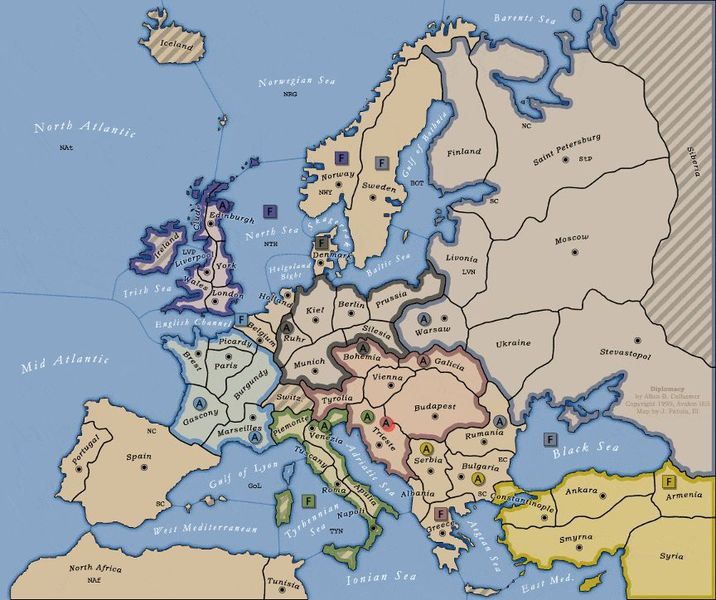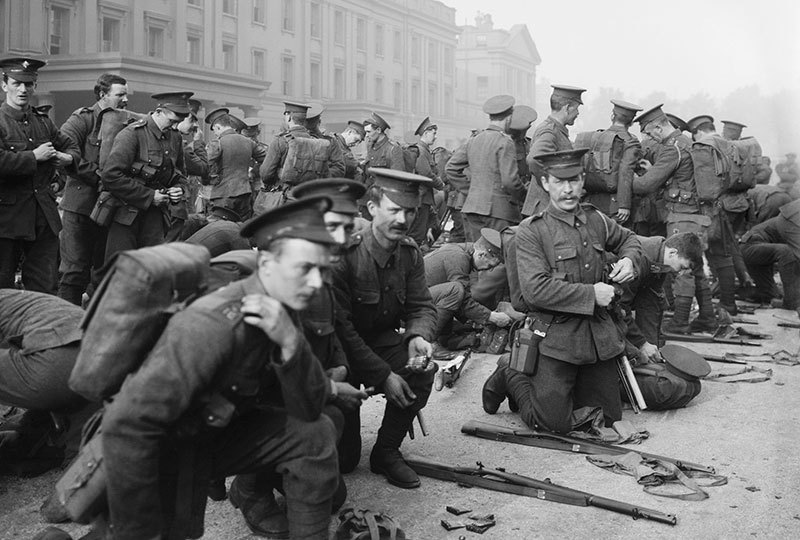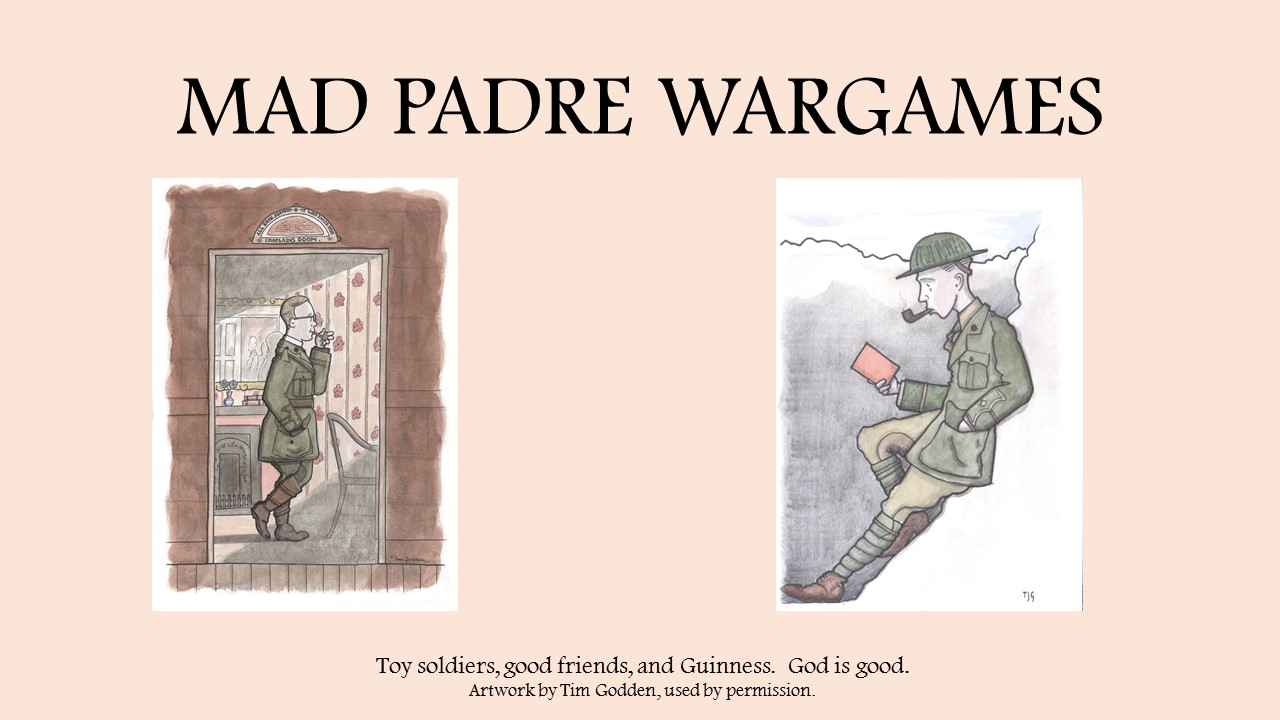Results for Fall, 1901 (Movement)

General Notices:
Order resolution completed on 14-Sep-2014 at 00:47:12 EDT
Order Results:
Austria: F alb -gre; Austria: A gal Holds; Austria: A tri Holds A tri Dislodged from tyr (2 against 1).
England: A edi -hol Bounced with ruh (1 against 1). Convoy path taken: edi-nth-hol; England: F nth Convoys A edi -hol; England: F nwg -nwy
France: A bur - gas; France: F pic -bel; France: A pie - mar
Germany: F den Holds; Germany: A ruh - hop Bounced with edi (1 against 1); Germany: A sil - boh
Italy: F nap - tys; Italy: A tyr -tri; Italy: A ven Supports A tyr - tri
Russia: F bot -swe; Russia: F sev -bla; Russia: A ukr - rum; Russia: A war - gal Bounced with gal (1 against 1).
Turkey: F ank -arm; Turkey: A bul -ser; Turkey: A con -bul
Supply Center Ownership:
Austria: Budapest, Greece, Vienna (3 total).
England: Edinburgh, Liverpool, London, Norway (4 total).
France: Belgium, Brest, Marseilles, Paris (4 total).
Germany: Berlin, Denmark, Kiel, Munich (4 total).
Italy: Naples, Rome, Trieste, Venice (4 total).
Russia: Moscow, Rumania, Sevastopol, St.
Petersburg, Sweden, Warsaw (6 total).
Turkey: Ankara, Bulgaria, Constantinople, Serbia, Smyrna (5 total).
Dislodged Units:
Austria: Army Trieste. Must retreat to either vie, bud or alb.
Deadline for end of Retreat Phase: This Tuesday, midnight EDT.
The Daily Dissembler, Special European Gazette Issue, October 15, 1901
We make sense of a complicated, far-off world so you, dear reader, can enjoy the Gilded Age.
Battle of Amsterdam: First Reports of a Major Battle
Our correspondent in Rotterdam, Mr. Erasmus Bork, has given us our first reports of a major clash between German and British forces in Holland. Two weeks ago His Majesty’s Imperial government announced that “England has sent a delegation to the Hague to discuss the agenda for a preliminary meeting on ways to reduce tensions on the continent.” However, last week it seemed to the started citizens of Amsterdam as if the British delegation was wearing khaki. On Sunday last, troops of the British Expeditionary Force, disembarked in the harbour and took positions just to the east of the city. The startled Dutch police and government chose not to oppose the British.

Soldiers of the British Expeditionary Force check their accoutrements and prepare to march out of Amsterdam.
The same day, the Germany First Army under General Fritz von Quack crossed the Dutch border marching on Amsterdam. By Tuesday evening, residents of Amsterdam heard artillery fire on the outskirts of the city.

German forces moving into Holland advance on Holland.
A week of fierce fighting followed, with the city’s eastern suburbs changing hands several times at bayonet point. Between the numerous guns of the German Army, which is lavishly equipped with siege artillery, and the supporting gunfire of the Royal Navy, damage to the city’s architecture has been severe and loss of life considerable. Finally, the exhausted participants withdrew, and a truce was declared after tireless negotiations and trips between the lines by members of the Swiss and American legations in the city. German troops have since withdrawn to their side of the border, and the British troops reembarked and returned to England. Our correspondent, Mr. Bork, reports that the Dutch authorities are now back in control of the situation, and that some British and German wounded and stragglers have been interned.

Our artist’s impression of hand-to-hand fighting on the outskirts of Amsterdam, as described by those who were there.
The Situation in Austria
Our correspondent in Vienna, Miss Amelia Roosevelt, intrepid girl reporter and niece of Vice-Presidential nominee Theodore Roosevelt, has cabled us with intelligence of grave import. Reports from the Ministry of War have credited Austrian arms with a great success in checking the advance of a Russian army attempting to invade Galicia. Reports of heavy fighting along the border indicate that while the Russian attacks were pressed gallantly in may places, they lacked the numbers to dislodge the Austrian defenders. Other communiques from the Ministry trumpet the news that Austrian warships have landed marines in the city of Athens, and that Greece is being added to the Empire. However, there are ominous reports of German troop columns marching unopposed into Bohemia, where, having reached the ancient town of Klodzko, they are expected at any moment to go on and occupy Prague. Meanwhile there is significant unrest in Vienna as the first refugees arrive from Trieste, bearing news of an Italian advance on that port city. Miss Roosevelt hopes to travel to Trieste shortly to report on the matter. Unease only mounts at stories that Turkish infantry have marched into Belgrade, and have been asking locals for directions to Budapest and Vienna. A run on banks has occurred in many Austrian cities, and many leading citizens have been applying for American visas. For the last few weeks, there has been an ominous silence from the palace, and rumours that the Austro-Hungarian Emperor is ill or incapacitated.

Austro-Hungarian troops defending the Galician border, from a photo released by the Austrian War Ministry.
Readers can expect another special issue of the Gazette as soon as more cables and dispatches arrive from our London office.

The old photos work great! Couldn't live without the Daily Dissembler!
ReplyDeleteThanks, Robert, I stole the old photos idea from you! Also from a Squad Leader blog: http://boxcarsagainaslblog.blogspot.ca
DeleteJust a quibble among friends, but it'd make your blog tidier if they were Large rather than X Large. The reader would still have the option to open in a new tab and zoom in..
DeleteI love the Daily Dissembler! Have the negotiations with Col Whatsit-Thingie over his fee concluded yet? I eagerly await his analysis.
It will all be over by Christmas.
ReplyDeleteHome before the leaves fall!
ReplyDeleteIndeed. I am sure no army is thinking about issuing winter clothing at this rate.
ReplyDeleteEspecially Austria!
DeleteWow! Nice trash talking there, Mr. King.
Delete